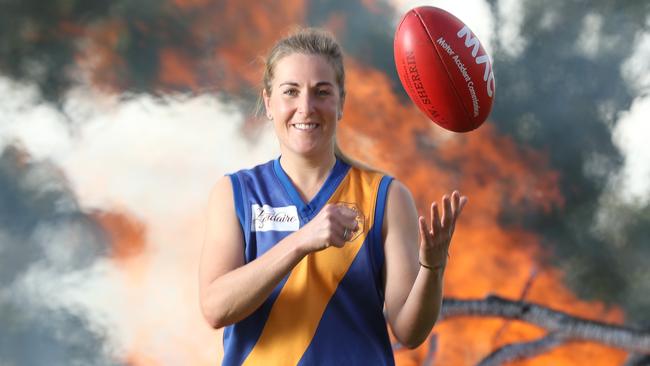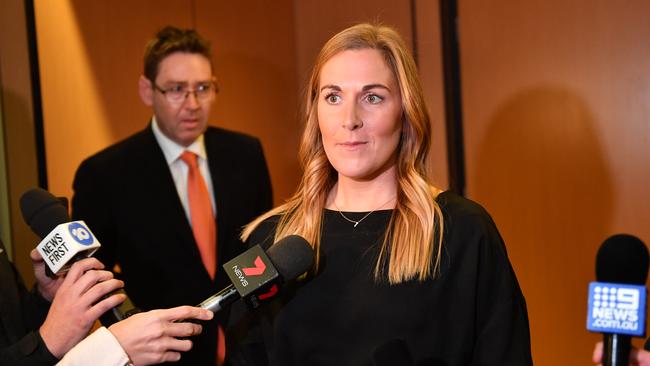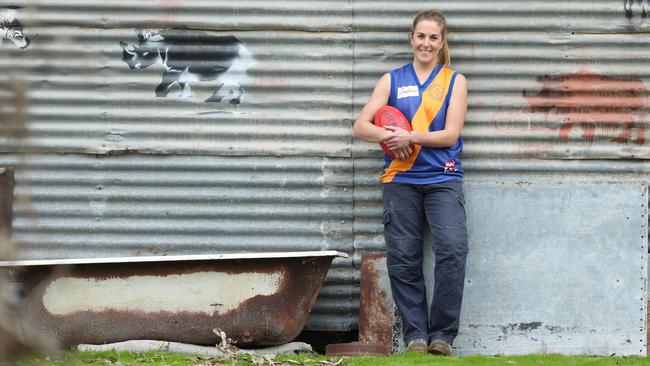Stacey Lee: Women should compete against men in sport. We do in everything else
If a woman like Casey McElroy wants to compete in her local footy team, understands the risks involved and still wants to play among the men for love of the game, then who are we to stop her, asks Stacey Lee.
Rendezview
Don't miss out on the headlines from Rendezview. Followed categories will be added to My News.
Casey McElroy should not be banned from playing men’s or women’s footy.
On Tuesday night the country footy player had her six-game suspension reduced to four weeks. Her crime? Playing in a men’s team.
Let’s recap how we got to this point. On May 25 the 27-year-old pulled on the guernsey for the South Australian Padthaway Lions men’s reserves team.
Seems innocent enough, but the problem is she did so without being registered.
According to the SANFL, the fact that she played as an unregistered player in an official match exposed her, her teammates and the opposition to insurance risk.
McElroy is a local sporting star. She won the Limestone Coast Women’s Football League best-and-fairest award last season and is also the coach and captain of the Padthaway netball team.
Her netball side had a bye on that week in May so she asked about whether she could play footy instead.
The women’s footy season isn’t on yet, so she trained with the men’s team and the coach agreed to let her play. The club president agreed to let her play. The opposing team agreed to let her play. So she did.

Don’t get me wrong, the issue is clearly registration and the SANFL is adamant it hasn’t banned her purely because she’s a woman.
“The breaches are clear and to think there would be no sanction for something that would really throw disorder into what is an organised sport is not viable,” SANFL general manager Adam Kelly said.
“We certainly understand Casey’s passion for footy and we’ve taken that into consideration.”
Adam Kelly made a point of saying the action was “not a gender issue”.
It’s all well and good to say that, but at the end of the day it is her gender that’s the issue.
McElroy will now miss half of the eight games in the Limestone Coast women’s league season because she’s a chick who dared play with the blokes.
RELATED: Casey McElroy seeking legal representation over SANFL suspension for playing in men’s team
Mr Kelly also said the legitimate registration of players and their eligibility to play was “paramount to the integrity” of the competition.
Of course. No one’s denying that. We need to make sure players are appropriately registered to play a game of footy, no matter what level they’re playing at.
But at the moment the Australian football Match Policy does not allow women and girls over the age of 14 to register for mixed-gender competitions. Even if the team, coach and club want them to play. They say it’s for insurance reasons, which makes sense.

We all want footballers to be insured on the field. So fix it. Change the insurance policy. It’s simple. Instead of using the regulation as an excuse, amend it to bring it up to 2019 standards.
Tribunal chairman Ian White made a good point on Tuesday night when he said the case was a “unique situation” with no precedent to rely on.
It certainly is, but it doesn’t mean this shouldn’t set a new precedent.
There was a time when indigenous Australians weren’t allowed to play football for some local teams. That rule was deemed to be discriminatory and outdated and it was changed, which is what should happen in this case.
A few years ago it was rare to see women on the field kicking a footy, let alone be able to watch them professionally. We now have a women’s state team which dominates the AFLW competition and more than 53,000 of us packed Adelaide Oval earlier in the year to watch it win its second grand final.
The verdict is in. This isn’t experimental anymore. Women want to play footy and people want to watch them play.
The SANFL needs to move with the times and update it’s rule book to allow women to play with the men for country teams.

Last week, South Australia’s Sports Minister Corey Wingard expressed the same sentiment when he said McElroy’s case should be reviewed.
“I think the six-week ban for the individual, for Casey, was probably a little bit harsh,” he said. “Getting numbers in country footy is tough and it’s great to have more and more women playing.
“It is something that needs to be re-looked at, having more women playing and playing with the men if they feel comfortable to do so.”
And that’s one of the main points here.
RELATED: Casey McElroy’s penalty for playing in men’s match reduced to four games by tribunal
She wanted to play with the men. She felt comfortable doing it so she put her hand up.
Some people will argue that because she’s a woman she runs a higher risk of getting injured on the field playing against men that are bigger than her. That argument would carry different weight if we were talking about women playing with men at a professional level. But we are not.
This was a game of country footy and all parties involved agreed to let her play.
Men get injured all the time playing footy. So what’s the big deal?
If she wants to play and wants to be a part of the team and understands the risks involved then who are we to stop her?
I can guarantee you she’s more fit and would have better skills on the field than many of the men who play country footy.


